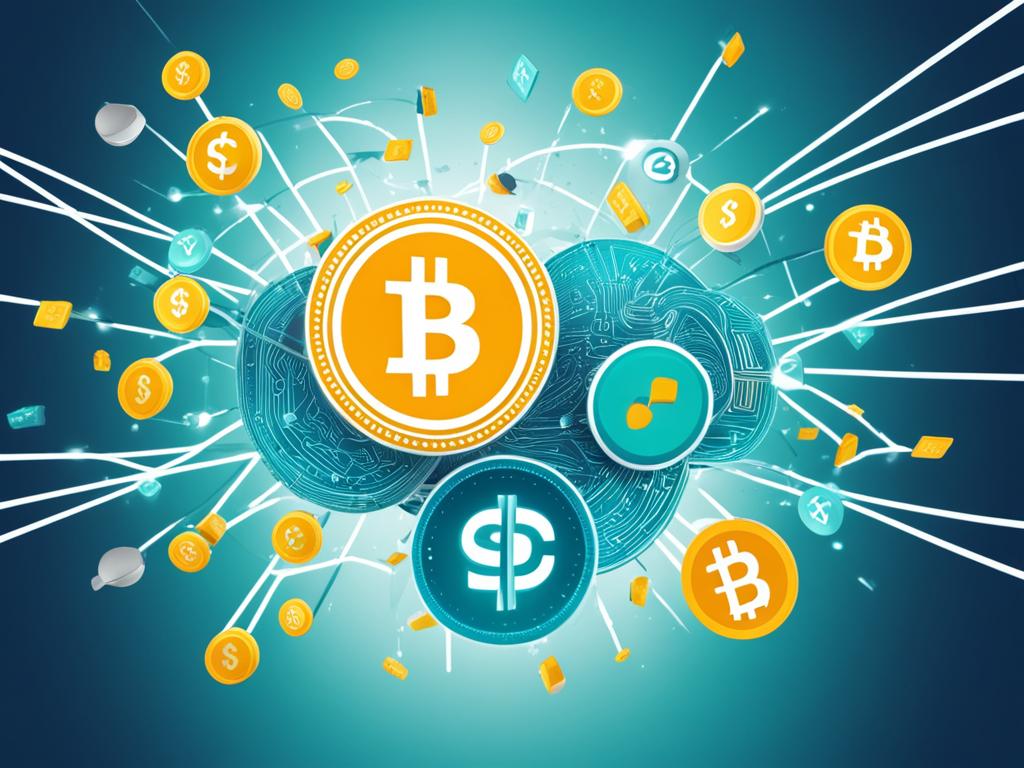
The Future of Cashless Payments and Digital Currency
The world of payments is changing fast. We’re moving towards a cashless future, and digital currencies and blockchain are key players. This article looks at how digital currency and blockchain are changing finance. It talks about the benefits and challenges of these new technologies in the future of payments.

Digital currencies like Bitcoin are bringing new ways to make transactions. They use advanced cryptography and a shared ledger to make transactions safe and clear. This offers a new option to traditional money and the banks that control it.
More people are using digital currencies, which means big changes for payments. Blockchain, the tech behind many digital currencies, could change how we handle money. It could make transactions faster, safer, and clearer, both here and around the world.
The Rise of Digital Currencies
The world of finance has seen a big change with the rise of digital currencies. These new kinds of money, known as cryptocurrencies, are changing how we see traditional banking. Bitcoin is leading this change, making way for more altcoins and digital currencies.
What is Digital Currency?
Digital currencies are a type of virtual money that only exists online. They don’t need to be printed or physically moved like regular money. Instead, they use blockchain technology for a secure and open way to create, store, and trade them. This new kind of money is changing the financial world, offering new chances and challenges for everyone.
Advantages of Digital Currencies
Digital currencies have many benefits that make them interesting to people and businesses. Some of the main advantages are:
- Accessibility: Digital currencies make it easier for those who don’t have access to traditional banking to get financial services.
- Transparency: All transactions with digital currencies are recorded openly, making everything clear and accountable.
- Speed and Efficiency: Digital currency deals are quicker and cheaper than old ways of sending money across borders.
- Security: Being decentralized and using blockchain technology, digital currencies are safer from fraud and theft.
As we move more into the digital age, digital currencies could change the financial world. They might change how we think about money and how we make transactions.

Digital Currency: Blockchain and Decentralized Finance
Blockchain technology is changing the game, making decentralized finance (DeFi) possible. DeFi is a new way to handle money that cuts out middlemen. It uses blockchain to make new kinds of transactions and ways to manage money.
At the core of DeFi is the blockchain, a secure digital ledger. It records all deals made. This tech lets us have crypto wallets and crypto exchanges. These tools let people trade money directly with each other, skipping banks.
DeFi is easy to get into. You just need the internet and a crypto wallet. This means more people can manage their money on their own. It’s a big change from the old way.
DeFi also makes things more trustworthy because of blockchain’s transparency. Every deal is on a ledger that can’t be changed. This cuts down on fraud and makes everyone more honest.
As blockchain and DeFi grow, they’re going to shake up traditional finance. They’re opening up new ways to invest, lend, and manage money. These changes could change how we see money and financial services.

Digital Currency and the Future of Payments
The world is moving towards a cashless society, and digital currency is leading the way. Cashless transactions are becoming more popular because they are convenient and secure. This change is happening fast, thanks to digital payment solutions.
The Shift Towards Cashless Transactions
Digital currency and cryptocurrency are driving the move to a cashless economy. People and businesses are choosing digital payments for their speed and efficiency. These methods are safer and easier than using cash.
The Role of Cryptocurrencies in the Future of Payments
Cryptocurrencies like Bitcoin and Ethereum are big names in the digital currency world. They use blockchain technology for secure and transparent transactions. This could change how we make payments worldwide.
- Cryptocurrencies could make payments faster, cheaper, and more accessible to everyone.
- They can help people who don’t have bank accounts get involved in the financial system.
- As more people use cryptocurrencies, they might become a big part of cashless transactions and digital currency payments.

Adding digital currency and cryptocurrency to how we make payments will change everything. It will make our financial world more efficient, secure, and open to everyone.
Challenges and Regulations
The use of digital currencies and cryptocurrencies is growing fast. This brings up challenges and worries about security and privacy.
Digital Currency: Addressing Security and Privacy Concerns
Digital currencies are not controlled by one person or group. This makes people worry about the safety of their money and the chance of illegal use, like money laundering or supporting terrorists. People in charge and experts are working hard to make strong regulations and safety steps.
To make digital currencies safer and more private, steps are being taken. These include:
- Using strict know-your-customer (KYC) and anti-money laundering (AML) rules to check who people are and stop them from using digital currencies for bad things.
- Creating better encryption and cybersecurity to keep wallets and transactions safe from hackers and thieves.
- Setting up clear regulatory frameworks and rules for the digital currency world. This gives everyone clear guidelines and makes things more stable for users and those who offer services.
As digital currencies keep changing, working together is key. Policymakers, industry leaders, and security experts must keep working together. This will help solve the problems and make a safe and trusted digital currency world.

Conclusion
Digital currencies and blockchain technology are changing how we think about payments and finance. They offer benefits like easy access, quick transactions, and better security. This shift is making the world move away from cash.
Blockchain, the tech behind many digital currencies, is also sparking a new financial world. This is called decentralized finance (DeFi). It aims to make financial services available to everyone. It lets people control their money better.
But, the path to making digital currencies and blockchain mainstream isn’t easy. Issues like security, privacy, and rules need to be solved. Governments are creating rules to help this new market grow right. The digital currency world must focus on being open, responsible, and protecting consumers.
FAQ
What is digital currency?
Digital currency is a type of money that exists only online. It’s not like the cash we use every day. Instead, it’s a digital way to store and use value for things like online shopping and sending money to others.
What are the advantages of digital currencies?
Digital currencies have many benefits. They are easy to get to, make transactions fast and cheap, and help more people have access to money. They also give people more control over their money and support new financial services.
How does blockchain technology enable decentralized finance?
Blockchain tech is the base for DeFi. It makes sure financial activities are safe, open, and can’t be changed. DeFi uses blockchain for things like direct money transfers, loans, and more, without needing banks.
What is the role of cryptocurrencies in the future of payments?
Cryptocurrencies are changing how we pay each other. They’re fast, cheap, and work well for sending money across borders. They’re especially useful in places where traditional banking is hard to get.
What are the security and privacy concerns surrounding digital currencies?
Digital currencies face big security and privacy issues. They can be at risk from hackers and theft. Also, people worry about who can see their digital money moves. Groups and experts are working hard to make these issues safer.



Thanks for the comprehensive overview of the current state of cashless payments and digital currency. You’ve given me a lot to think about!
Nice update, digital currency has so many advantages.